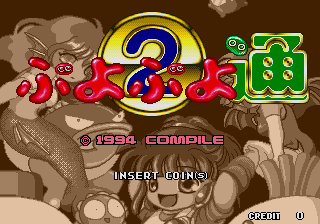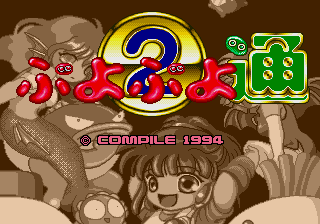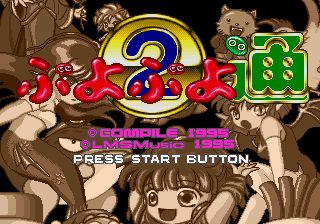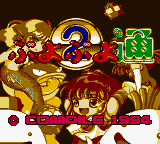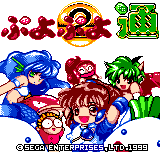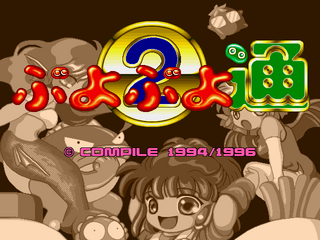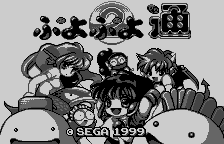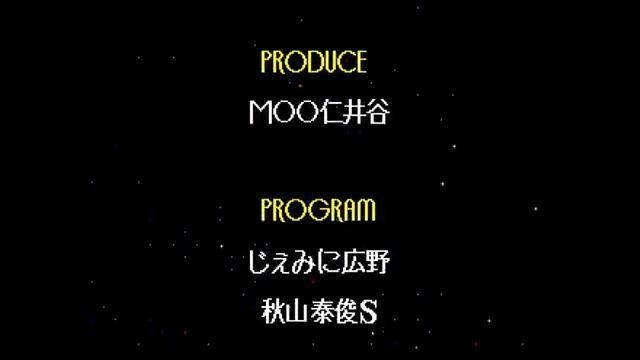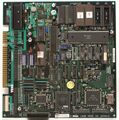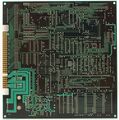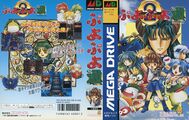Difference between revisions of "Puyo Puyo Tsuu"
From Sega Retro
Hyperspeed34 (talk | contribs) |
|||
| (187 intermediate revisions by 27 users not shown) | |||
| Line 1: | Line 1: | ||
| + | {{OtherPage|desc=the mobile port|page=Puyo Puyo Tsuu (mobile)}} | ||
{{Bob | {{Bob | ||
| − | | bobscreen= | + | | bobscreen=PuyoPuyoTsu_SystemC2TitleScreen.png |
| − | | publisher=[[Compile]] | + | | bobscreen2=PuyoPuyoTsuu_MDTitleScreen.png |
| − | | developer=[[Compile]] | + | | bobscreen3=PuyoPuyoTsuu_Saturn_JP_SSTitle.png |
| − | | system=[[Sega | + | | bobscreen4=PuyoPuyoTsuu_GG_JP_SSTitle.png |
| − | | | + | | bobscreen5=PuyoPuyoTsuu_NGP_JP_SSTitle.png |
| − | | | + | | bobscreen6=PuyoPuyoTsu WindowsPCTitleScreen.png |
| − | | | + | | bobscreen7=PuyoPuyoTsuu_WS_JP_SSTitle.png |
| + | | noresize7=yes | ||
| + | | tab1=System C2 | ||
| + | | tab2=Mega Drive | ||
| + | | tab3=Saturn | ||
| + | | tab4=Game Gear | ||
| + | | tab5=Neo Geo Pocket Color | ||
| + | | tab6=Windows PC | ||
| + | | tab7=WonderSwan | ||
| + | | publisher={{multicol| | ||
| + | {{company|[[Compile]]|system=SYSC2,MD,GG,SAT|inline=no}} | ||
| + | {{company|[[SNK]]|system=NGPC|inline=no}} | ||
| + | {{company|[[Bandai]]|system=WS|inline=no}} | ||
| + | }} | ||
| + | | developer={{multicol| | ||
| + | {{company|[[Compile]]|system=SYSC2,MD,GG|inline=no}} | ||
| + | {{company|[[Bits Laboratory]]|system=SAT|inline=no}} | ||
| + | {{company|[[Sega]]|system=NGPC,WS|inline=no}} | ||
| + | {{company|[[M2]]{{ref|https://www.mtwo.co.jp/development/retrogame-2/#tab-1}}{{ref|https://www.mtwo.co.jp/development/retrogame-2/#tab-3}}{{ref|https://www.mtwo.co.jp/development/retrogame-2/#tab-4}}|system=VC,VC3DS}} | ||
| + | }} | ||
| + | | support={{company|[[LMS Music]]|system=SAT|role=audio}} | ||
| + | | distributor={{company|[[Sega]]|system=SYSC2}} | ||
| + | | licensor={{company|[[Sega]]|system=WS,NGPC}} | ||
| + | | portal={{company|[[Puyo Puyo! Sega]]|system=Android|region=JP}} | ||
| + | | system=[[Sega System C2]], [[Sega Mega Drive]], [[Sega Game Gear]], [[Sega Saturn]], [[Neo Geo Pocket Color]], [[Windows PC]], [[WonderSwan]], [[Virtual Console]], [[Android]] | ||
| + | | sounddriver={{SAT}} SCSP (1 track) | ||
| + | | peripherals={{GG}} [[Gear-to-Gear Cable]] | ||
| + | | players=1-2 | ||
| + | | genre=Action Puzzle{{fileref|PuyoPuyo2 MD JP Box.jpg}}{{fileref|PuyoPuyo2 Saturn JP Box Back.jpg}}{{fileref|PuyoPuyoTsuu GG JP Box Front.jpg}}, Puzzle{{ref|https://web.archive.org/web/20200702232146/https://sega.jp/history/hard/megadrive/software_l.html}}{{ref|https://web.archive.org/web/20200320230433/https://sega.jp/fb/segahard/ss/soft_licensee1.html}}{{ref|https://web.archive.org/web/20130101202427/http://sega.jp/fb/segahard/gg/soft_licensee.html}} | ||
| + | | releases={{releasesArcade | ||
| + | | sysc2_date_jp=1994-09{{ref|http://web.archive.org/web/20110610001024/http://vc.sega.jp:80/vca_puyo2/}} | ||
| + | }} | ||
| + | {{releasesMD | ||
| + | | md_date_jp=1994-12-02{{ref|https://web.archive.org/web/20200702232146/https://sega.jp/history/hard/megadrive/software_l.html}} | ||
| + | | md_code_jp=T-66013 | ||
| + | | md_rrp_jp=6,800 | ||
| + | }} | ||
| + | {{releasesGG | ||
| + | | gg_date_jp=1994-12-16{{ref|https://web.archive.org/web/20130101202427/http://sega.jp/fb/segahard/gg/soft_licensee.html}} | ||
| + | | gg_code_jp=T-66037 | ||
| + | | gg_rrp_jp=3,800 | ||
| + | }} | ||
| + | {{releasesSat | ||
| + | | sat_date_jp=1995-10-27{{ref|https://web.archive.org/web/20200320230433/https://sega.jp/fb/segahard/ss/soft_licensee1.html}} | ||
| + | | sat_code_jp=T-6601G | ||
| + | | sat_rrp_jp=4,800e{{fileref|PuyoPuyoTsuu Saturn JP Flyer.pdf}} | ||
| + | | sat_date_jp_s=1997-06-20 | ||
| + | | sat_code_jp_s=T-6604G | ||
| + | | sat_rrp_jp_s=2,800 | ||
| + | | sat_rating_jp_s=all | ||
| + | }} | ||
| + | {{releasesNGPC | ||
| + | | ngpc_date_jp=1999-07-22{{ref|https://web.archive.org/web/20000116213707/http://www2.neogeo.co.jp/soft/c_puyo/index.html}} | ||
| + | | ngpc_code_jp=NEOP00410 | ||
| + | | ngpc_rrp_jp=3,800{{ref|https://web.archive.org/web/20000116213707/http://www2.neogeo.co.jp/soft/c_puyo/index.html}} | ||
| + | | ngpc_date_us=1999-09-21{{ref|https://web.archive.org/web/19991009142001/http://www.tronixweb.com:80/new.html}} | ||
| + | | ngpc_code_us=NEOP00411 | ||
| + | | ngpc_rating_us=e | ||
| + | | ngpc_date_eu=1999-11-26{{ref|1=https://web.archive.org/web/20010415152852/http://www.chipsworld.co.uk/detProd.asp?ProductCode=1676}} | ||
| + | | ngpc_rrp_uk=24.99{{magref|cvg|220|99}} | ||
| + | | ngpc_code_eu=NEOP0041 | ||
| + | }} | ||
| + | {{releases | ||
| + | | ws_date_jp=1999-03-11{{ref|http://web.archive.org/web/20030805024409/http://www.swan.channel.or.jp/swan/software/line_up/puyo/index.html}} | ||
| + | | ws_code_jp=SWJ-BAN004 | ||
| + | | ws_rrp_jp=3,600 | ||
| + | }} | ||
| + | {{releasesPC | ||
| + | | pc_date_jp_Special Price=xxxx | ||
| + | | pc_date_jp_DigiCube=xxxx | ||
| + | }} | ||
| + | {{releasesWii | ||
| + | | vc_date_jp=2007-04-24{{ref|http://web.archive.org/web/20180306002649/https://www.nintendo.co.jp/wii/vc/software/03.html}} | ||
| + | | vc_rrp_jp=600{{ref|http://web.archive.org/web/20070423065942/http://vc.sega.jp:80/vc_puyo2/}} | ||
| + | | vc_rating_jp=a | ||
| + | | vc_date_us=2008-03-10{{ref|http://web.archive.org/web/20101122224542/http://www.nintendo.com/games/detail/veYJinSM9ynV1TYmbC3HDWzWimGIg5lU}} | ||
| + | | vc_rrp_us=900{{ref|http://web.archive.org/web/20101122224542/http://www.nintendo.com/games/detail/veYJinSM9ynV1TYmbC3HDWzWimGIg5lU}} | ||
| + | | vc_rating_us=e | ||
| + | | vc_date_eu=2008-05-09{{ref|http://web.archive.org/web/20171018052522/http://www.nintendolife.com/games/megadrive/puyo_puyo_2_tsuu}}{{ref|https://archive.is/vXnLp|https://www.nintendo.co.uk/Games/Virtual-Console-Wii-/Puyo-Puyo-2-278667.html}} | ||
| + | | vc_rrp_eu=900{{ref|http://web.archive.org/web/20171018052522/http://www.nintendolife.com/games/megadrive/puyo_puyo_2_tsuu}} | ||
| + | | vc_rating_eu=3 | ||
| + | | vc_date_au=2008-05 | ||
| + | | vc_rrp_au=900{{ref|1=http://web.archive.org/web/20120403023445/http://www.nintendo.com.au/index.php?action=catalogue&prodcat_id=41&prod_id=19762&pageID=4}} | ||
| + | | vc_rating_au=g | ||
| + | | vca_date_jp=2011-06-07{{ref|http://web.archive.org/web/20180310233605/https://www.nintendo.co.jp/wii/vc/software/13.html}} | ||
| + | | vca_rrp_jp=800{{ref|http://web.archive.org/web/20110610001024/http://vc.sega.jp:80/vca_puyo2/}} | ||
| + | | vca_rating_jp=a | ||
| + | }} | ||
| + | {{releases3DS | ||
| + | | vc3ds_date_jp=2013-12-25{{ref|http://web.archive.org/web/20131222230655/http://vc.sega.jp:80/3ds/puyo2/}} | ||
| + | | vc3ds_rrp_jp=381 (''400''){{ref|http://web.archive.org/web/20131222230655/http://vc.sega.jp:80/3ds/puyo2/}} | ||
| + | | vc3ds_rating_jp=a | ||
| + | }} | ||
| + | {{releasesAndroid | ||
| + | | android_date_jp=201x | ||
| + | | android_date_jp_ps=2011-09-12{{ref|https://web.archive.org/web/20111005001318/http://sega.jp/kt/}} | ||
| + | | android_rrp_jp_ps=sub | ||
| + | }} | ||
| + | | elspa=3 | ||
| + | | otherformats={{NonSega|Arcade|IBMPC|GB|SGB|Mac|PC9821|SNES|SCDROM2|PS}} | ||
| + | }} | ||
| + | '''''{{PAGENAME}}''''' (ぷよぷよ通) or '''''Puyo Puyo 2''''' is a puzzle game developed by [[Compile]] in 1994, initially released for [[Sega]]'s [[System C-2]] arcade board before being ported to other consoles (such as the [[Sega Mega Drive]], [[Sega Game Gear]], and [[Sega Saturn]]). It is the sequel to the Sega/Compile version of ''[[Puyo Puyo]]'', whose path the entire series has followed to date. | ||
| + | |||
| + | The standalone game was exclusively released in Japan until 1999, when Sega ported it to the [[Neo Geo Pocket Color]] under the name '''''Puyo Pop''''' in the US/Europe (unrelated to the GBA ''Puyo Pop'' ''[[Minna de Puyo Puyo]]'') — making it the first ''Puyo Puyo'' game to be released outside Japan unaltered (and establishing the ''Puyo Puyo''/''Puyo Pop'' naming discretion still used today). It was also included as the Classic mode of ''[[Puyo Pop Fever]]'' and later rereleased on the Virtual Console's Import section (albeit untranslated). | ||
| + | |||
| + | Sega also produced a port to [[Bandai]]'s WonderSwan handheld. Later [[Windows PC]] re-releases also credit Sega, who had at this point acquired the ''Puyo Puyo'' IP from Compile. | ||
| + | |||
| + | ==Gameplay== | ||
| + | While the 1992 release of ''Puyo Puyo'' is credited for introducing competitive play, the improvements made in ''Puyo Puyo Tsuu'' made it a gold standard for tournaments, and the basis for all ''Puyo Puyo'' releases going forward. Unlike its predecessors, no non-competitive single player modes exist in ''Tsuu'' (i.e. "practice" or "endless") - the player is always pitted against a human or AI opponent (an exception being the later Sega Saturn version, which brings these modes back). | ||
| + | |||
| + | ''Puyo Puyo Tsuu'' introduces a concept known as "sousai" (相殺), commonly translated as "offsetting" or "countering" as a form of defense against incoming ojama puyo. If, while ojama puyo are queued to land in your play area, you are able to pop puyo, the resulting ojama created in your turn will cancel out the ojama your queue. For example, if five ojama are queued and your pop creates four, you will only receive one ojama puyo. Furthermore, if in this situation you create six ojama puyo, your opponent will receive one instead. | ||
| + | |||
| + | While the sousai rule can be disabled, it typically leads to shorter games, as skilled players can both send ojama puyo to their opponent, and avoid receiving any ojama puyo themselves. Subsequently, this style of gameplay leans towards a need for large chains obtained within the shortest possible time. The scoring has also been revised so that the big points are only available to those who can create these large chains. | ||
| + | |||
| + | As with all ''Puyo Puyo'' titles, five different colours of puyo exist, however unlike its predecessors, ''Puyo Puyo Tsuu'' rarely uses all five colours at once. Instead it is more common for four colours to be used, which in turn leads to a greater chance of producing chains (''[[Puyo Puyo Sun]]'' would later reduce this to three colours for earlier stages). As fewer colours in play usually leads to more popping, players are less likely to lose based on puyo placements alone. | ||
| + | |||
| + | With "Rule Henka" enabled, two new types of ojama puyo come into play. "Kata puyo" (固ぷよ), resembling ice blocks, are twice as strong as ojama (but are popped in the same way) and "tokuten puyo" (得点ぷよ) increase the player's score if popped. The "Rensa Shibari" option also allows players to dictate how many chains are needed to generate ojama puyo. | ||
| + | |||
| + | Also new to ''Tsuu'' is the "quick turn" (クイックターン) feature. If a falling pair of puyo is obstructed on both sides, rotating will cause the pair to flip, with the top puyo becoming the bottom and vice versa. Also, while previous ''Puyo Puyo'' ganes only show a preview of the next piece, ''Tsuu'' shows two upcoming pieces, theoretically allowing the player to plan further ahead. | ||
| + | |||
| + | Finally "zen keshi" (全消し) or "full erase" bonuses are awarded if the player manages to pop all the puyo in their play area. This in turn causes a significant amount of ojama (or tokuten) puyo to be sent to the opposing player after the next pop. | ||
| + | |||
| + | While the single player campaign is similar to 1992's ''Puyo Puyo'', it is now less linear, with multiple stages of progession accessed only when the player has achived enough "rest points". Opponents are to some degree randomised, and given that each opponent uses different tactics, this means it is less likely two playthroughs will be the same. Furthermore some opponents only appear if the player deliberately scores too few rest points, or manages to level up without using any continues. | ||
| + | |||
| + | A unique technical feature to the Mega Drive version is a "voice" option. While sampled speech cannot be turned off during normal play, the player can opt for lower quality samples that do not interrupt the music. | ||
| + | |||
| + | The Saturn version contains the SNES port's Rally mode and adds full voice acting to that version's pre-battle cutscenes. | ||
| + | |||
| + | ==Versions== | ||
| + | The Mega Drive version was the first MD game to use the new [[Saturn]]-style box layout in the JP region. | ||
| + | |||
| + | ===Comparisons=== | ||
| + | {{mainArticle|{{PAGENAME}}/Comparisons}} | ||
| + | |||
| + | ==History== | ||
| + | ===Legacy=== | ||
| + | [[Sega Logistics Service]] announced it would end service on the arcade machines on March 31, 2017.{{fileref|SegaProductsTerminationAnnouncement 2016-11 JP.pdf}}{{fileref|SegaProductsTerminationAnnouncement 2016-12.pdf}} | ||
| + | |||
| + | ==Production credits== | ||
| + | ===Mega Drive version=== | ||
| + | {{creditstable| | ||
| + | *'''Produce:''' [[Masamitsu Niitani|Moo Niitani]] | ||
| + | *'''Program:''' [[Takayuki Hirono|Jemini Hirono]], [[Yasutoshi Akiyama|Yasutoshi Akiyama S]] | ||
| + | *'''Design:''' Riu.S.Aya | ||
| + | *'''Sound & Voice:''' [[Tsuyoshi Matsushima]] (LMS Music), [[Tomonori Minami|BA.M]] (LMS Music) | ||
| + | *'''Manual & Package:''' [[Fukusaburo Kido]], [[Sonchoh Sawa]] | ||
| + | *'''Special Thanks:''' Kazuhiko Kitade, [[Kengo Morita|Kengo Morita (24)]] | ||
| + | :'''© [[Compile]] 1994''' | ||
| + | | source=In-game credits | ||
| + | | pdf=Puyo Puyo Tsuu MD credits.pdf | ||
| + | | console=MD | ||
}} | }} | ||
| − | |||
| − | + | ===Saturn version=== | |
| − | + | {{creditstable| | |
| − | + | *'''プログラム作成 MD版からの移植 ゲーム本編:''' 金山 索志 (Bit Laoratory) | |
| + | *'''CD、サウンド、全プログラムリンク作業:''' 鶴岡 義明 (Bit Laoratory) | ||
| + | *'''オプション画面、ペリフェラル、シネパック:''' 本間 直純 (Bit Laoratory) | ||
| + | *'''漫才デモ、エンディング:''' 嶋田 智幸 (Game Arts) | ||
| + | *'''現場監督、進行管理:''' 長村 琢哉 (Game Arts) | ||
| + | | source=In-CD-ROM credits (COPYRIGH.TXT) | ||
| + | | console=SAT | ||
| + | }} | ||
| + | ===WonderSwan version=== | ||
| + | :''TODO confirm against ending (this is ripped from ROM)'' | ||
| + | {{creditstable| | ||
| + | *'''Planner:''' [[Masato Shimamura|Masato Simamura]], [[Kaoru Fujiwara]] | ||
| + | *'''Programmer:''' [[Osamu Kodera]] | ||
| + | *'''Special Programmer:''' [[Tadashi Eda]] | ||
| + | *'''Graphic:''' [[Akiko Saito]] | ||
| + | *'''Sound:''' [[Hideki Ave]] ([[Hideki Abe]]?) | ||
| + | *'''Special Thanks:''' [[Go Tsuzuki]] | ||
| + | | source=ROM | ||
| + | | console=WS | ||
| + | }} | ||
| − | == | + | ==Digital manuals== |
| − | |||
<gallery> | <gallery> | ||
| − | + | PuyoPuyoTsuu MD JP MDMini manual.pdf|Mega Drive Mini JP manual | |
| − | |||
</gallery> | </gallery> | ||
| − | |||
| − | |||
| − | + | ==Magazine articles== | |
| − | === | + | {{mainArticle|{{PAGENAME}}/Magazine articles}} |
| + | |||
| + | ==Promotional material== | ||
| + | {{mainArticle|{{PAGENAME}}/Promotional material}} | ||
| + | |||
| + | ==Photo gallery== | ||
<gallery> | <gallery> | ||
| − | + | PuyoPuyoTsuu SystemC PCB Top.jpg|System C PCB (top) | |
| − | + | PuyoPuyoTsuu SystemC PCB Bottom.jpg|System C PCB (bottom) | |
| − | |||
</gallery> | </gallery> | ||
| + | ==Physical scans== | ||
| + | ===System C version=== | ||
| + | {{ScanArcade | ||
| + | | console=System C | ||
| + | | region=JP | ||
| + | | instructionstop=PuyoPuyoTsuu SystemC JP Instructions Top.jpg | ||
| + | | instructionslong=PuyoPuyoTsuu SystemC JP Instructions Long.jpg | ||
| + | | instructioncard1=PuyoPuyoTsuu SystemC JP InstructionCard 1.jpg | ||
| + | | instructioncard2=PuyoPuyoTsuu SystemC JP InstructionCard 2.jpg | ||
| + | }} | ||
| + | |||
| + | ===Mega Drive version=== | ||
| + | {{ratings|MD}} | ||
| + | {{Scanbox | ||
| + | | console=Mega Drive | ||
| + | | region=JP | ||
| + | | cover=PuyoPuyo2 MD JP Box.jpg | ||
| + | | cart=PuyoPuyo2 MD JP Cart.jpg | ||
| + | | carttop=PuyoPuyoTsuu_MD_JP_CartTop.jpg | ||
| + | | manual=Puyopuyotsuu md jp manual.pdf | ||
| + | }} | ||
| + | |||
| + | ===Game Gear version=== | ||
| + | {{ratings|GG}} | ||
| + | {{Scanbox | ||
| + | | console=Game Gear | ||
| + | | region=JP | ||
| + | | front=PuyoPuyoTsuu GG JP Box Front.jpg | ||
| + | | back=PuyoPuyoTsuu GG JP Box Back.jpg | ||
| + | | spinemissing=yes | ||
| + | | cart=PuyoPuyoTsuu GG JP Cart.jpg | ||
| + | | square=yes | ||
| + | | manual=PuyoPuyoTsuu_GG_JP_Manual.pdf | ||
| + | }} | ||
| + | |||
| + | ===Saturn version=== | ||
| + | {{ratings|SAT}} | ||
| + | {{Scanbox | ||
| + | | console=Saturn | ||
| + | | region=JP | ||
| + | | front=PuyoPuyo2 Saturn JP Box Front.jpg | ||
| + | | back=PuyoPuyo2 Saturn JP Box Back.jpg | ||
| + | | disc=PuyoPuyoTsuu Saturn JP Disc.jpg | ||
| + | | spinecard=PuyoPuyoTsuuSaturnJPSpine.jpg | ||
| + | | square=yes | ||
| + | }}{{Scanbox | ||
| + | | console=Saturn | ||
| + | | region=JP ([[Satakore]]) | ||
| + | | front=PuyoPuyo2 Saturn JP Box Front Satakore.jpg | ||
| + | | back=PuyoPuyoTsuu Saturn JP Box Back Satakore.jpg | ||
| + | | disc=PuyoPuyoTsuu Saturn JP Disc Satakore.jpg | ||
| + | | spinecard= | ||
| + | | square=yes | ||
| + | | manual=PuyoPuyoTsuu_SS_jp_manual_Satakore.pdf | ||
| + | }} | ||
| + | |||
| + | ===Neo Geo Pocket Color version=== | ||
| + | {{ratings|NGPC}} | ||
| + | {{Scanbox | ||
| + | | console=Neo Geo Pocket Color | ||
| + | | region=US | ||
| + | | front=PuyoPuyoTsuu NGPC US Box Front.jpg | ||
| + | | back= | ||
| + | | spinemissing= | ||
| + | | square=yes | ||
| + | | cart= | ||
| + | }}{{Scanbox | ||
| + | | console=Neo Geo Pocket Color | ||
| + | | region=EU | ||
| + | | cover=PuyoPuyoTsuu NGPC EU Box.jpg | ||
| + | | square=yes | ||
| + | | cart=PuyoPop NGPC EU Cart.jpg | ||
| + | }}{{Scanbox | ||
| + | | console=Neo Geo Pocket Color | ||
| + | | region=JP | ||
| + | | cover=PuyoPuyoTsuu NGPC JP Box.jpg | ||
| + | | square=yes | ||
| + | | cart=PuyoPuyoTsuu NGPC JP Cart.jpg | ||
| + | }} | ||
| + | |||
| + | ===Windows PC version=== | ||
| + | {{Scanbox | ||
| + | | console=PC | ||
| + | | region=JP (Special Price) | ||
| + | | front= | ||
| + | }} | ||
| + | {{Scanbox | ||
| + | | console=PC | ||
| + | | region=JP (DigiCube) | ||
| + | | front= | ||
| + | }} | ||
| + | |||
| + | ===WonderSwan version=== | ||
| + | {{Scanbox | ||
| + | | console=WonderSwan | ||
| + | | region=JP | ||
| + | | front=PuyoPuyoTsuu WS JP Box Front.jpg | ||
| + | | back=PuyoPuyoTsuu WS JP Box Back.jpg | ||
| + | | spine2=Puyo Puyo Tsu Wonderswan JP Spine2.jpg | ||
| + | | spine=Puyo Puyo Tsu Wonderswan JP Spine.jpg | ||
| + | | top=Puyo Puyo Tsu Wonderswan JP Top.jpg | ||
| + | | bottom=Puyo Puyo Tsu Wonderswan JP Bottom.jpg | ||
| + | | manual=Puyo Puyo Tsu Wonderswan JP Manual.pdf | ||
| + | | cart=PuyoPuyoTsuu WS JP Cart.jpg | ||
| + | | item1=Puyo_Puyo_Tsu_Wonderswan_JP_RegCard.pdf | ||
| + | | item1name=Registration card | ||
| + | }} | ||
| + | |||
| + | ==Technical information== | ||
| + | {{mainArticle|{{PAGENAME}}/Technical information}} | ||
| + | |||
| + | ==External links== | ||
| + | * Sega of Japan Virtual Console pages: [http://vc.sega.jp/vc_puyo2/ Mega Drive], [http://vc.sega.jp/vca_puyo2/ Arcade] | ||
| + | * Sega of Japan 3DS VC catalogue pages: [http://vc.sega.jp/3ds/puyo2/ Game Gear] | ||
| + | * Nintendo catalogue pages: Wii Virtual Console: [https://www.nintendo.com/games/detail/veYJinSM9ynV1TYmbC3HDWzWimGIg5lU US], [https://www.nintendo.co.uk/Games/Virtual-Console-Wii-/Puyo-Puyo-2-278667.html UK], [http://web.archive.org/web/20120403023445/http://www.nintendo.com.au/index.php?action=catalogue&prodcat_id=41&prod_id=19762&pageID=4 AU]; Nintendo 3DS Virtual Console: [https://www.nintendo.co.jp/titles/50010000017977 JP] | ||
| + | * [http://www.swan.channel.or.jp/swan/software/line_up/index_PYO01.html Bandai's page for the WonderSwan version (Japanese)] | ||
| + | * [https://play.google.com/store/apps/details?id=jp.co.sega.puyotsu.puyotsu_tenkey ''{{PAGENAME}}'' on Google Play] (offline) | ||
| + | * [https://play.google.com/store/apps/details?id=jp.co.sega.puyotsu.puyotsu2d_monthly_sum ''{{PAGENAME}}'' PuyoSega version on Google Play] (offline) | ||
| + | |||
| + | ==References== | ||
| + | {{NECRetro|italics=yes}} | ||
| + | {{NECRetro|italics=yes|title=Puyo Puyo CD Tsuu}} | ||
| + | <references/> | ||
| + | |||
| + | {{PuyoPuyoTsuuOmni}} | ||
{{PuyoPuyo}} | {{PuyoPuyo}} | ||
| − | + | [[Category:Mega Drive Mini games]] | |
| − | + | [[Category:Game Gear Micro games]] | |
| − | |||
| − | |||
| − | [[Category:Mega Drive | ||
| − | |||
| − | |||
| − | [[Category:Game Gear | ||
| − | |||
| − | |||
| − | |||
| − | |||
Revision as of 01:38, 13 May 2024
- For the mobile port, see Puyo Puyo Tsuu (mobile).
| Puyo Puyo Tsuu | ||||||||||||||||||||||||||||||||||||||||||||||||||||||||||||||||||||||||||||||||||||||||||||||||||
|---|---|---|---|---|---|---|---|---|---|---|---|---|---|---|---|---|---|---|---|---|---|---|---|---|---|---|---|---|---|---|---|---|---|---|---|---|---|---|---|---|---|---|---|---|---|---|---|---|---|---|---|---|---|---|---|---|---|---|---|---|---|---|---|---|---|---|---|---|---|---|---|---|---|---|---|---|---|---|---|---|---|---|---|---|---|---|---|---|---|---|---|---|---|---|---|---|---|---|
| System(s): Sega System C2, Sega Mega Drive, Sega Game Gear, Sega Saturn, Neo Geo Pocket Color, Windows PC, WonderSwan, Virtual Console, Android | ||||||||||||||||||||||||||||||||||||||||||||||||||||||||||||||||||||||||||||||||||||||||||||||||||
| Publisher: | ||||||||||||||||||||||||||||||||||||||||||||||||||||||||||||||||||||||||||||||||||||||||||||||||||
| Developer: | ||||||||||||||||||||||||||||||||||||||||||||||||||||||||||||||||||||||||||||||||||||||||||||||||||
| Supporting companies: LMS Music (audio) | ||||||||||||||||||||||||||||||||||||||||||||||||||||||||||||||||||||||||||||||||||||||||||||||||||
| Distributor: Sega | ||||||||||||||||||||||||||||||||||||||||||||||||||||||||||||||||||||||||||||||||||||||||||||||||||
| Licensor: Sega | ||||||||||||||||||||||||||||||||||||||||||||||||||||||||||||||||||||||||||||||||||||||||||||||||||
| Distribution portal: Puyo Puyo! Sega (JP) | ||||||||||||||||||||||||||||||||||||||||||||||||||||||||||||||||||||||||||||||||||||||||||||||||||
| Sound driver: SCSP (1 track) | ||||||||||||||||||||||||||||||||||||||||||||||||||||||||||||||||||||||||||||||||||||||||||||||||||
| Peripherals supported: Gear-to-Gear Cable | ||||||||||||||||||||||||||||||||||||||||||||||||||||||||||||||||||||||||||||||||||||||||||||||||||
| Genre: Action Puzzle[4][5][6], Puzzle[7][8][9] | ||||||||||||||||||||||||||||||||||||||||||||||||||||||||||||||||||||||||||||||||||||||||||||||||||
| Number of players: 1-2 | ||||||||||||||||||||||||||||||||||||||||||||||||||||||||||||||||||||||||||||||||||||||||||||||||||
| ||||||||||||||||||||||||||||||||||||||||||||||||||||||||||||||||||||||||||||||||||||||||||||||||||
| ||||||||||||||||||||||||||||||||||||||||||||||||||||||||||||||||||||||||||||||||||||||||||||||||||
Puyo Puyo Tsuu (ぷよぷよ通) or Puyo Puyo 2 is a puzzle game developed by Compile in 1994, initially released for Sega's System C-2 arcade board before being ported to other consoles (such as the Sega Mega Drive, Sega Game Gear, and Sega Saturn). It is the sequel to the Sega/Compile version of Puyo Puyo, whose path the entire series has followed to date.
The standalone game was exclusively released in Japan until 1999, when Sega ported it to the Neo Geo Pocket Color under the name Puyo Pop in the US/Europe (unrelated to the GBA Puyo Pop Minna de Puyo Puyo) — making it the first Puyo Puyo game to be released outside Japan unaltered (and establishing the Puyo Puyo/Puyo Pop naming discretion still used today). It was also included as the Classic mode of Puyo Pop Fever and later rereleased on the Virtual Console's Import section (albeit untranslated).
Sega also produced a port to Bandai's WonderSwan handheld. Later Windows PC re-releases also credit Sega, who had at this point acquired the Puyo Puyo IP from Compile.
Contents
Gameplay
While the 1992 release of Puyo Puyo is credited for introducing competitive play, the improvements made in Puyo Puyo Tsuu made it a gold standard for tournaments, and the basis for all Puyo Puyo releases going forward. Unlike its predecessors, no non-competitive single player modes exist in Tsuu (i.e. "practice" or "endless") - the player is always pitted against a human or AI opponent (an exception being the later Sega Saturn version, which brings these modes back).
Puyo Puyo Tsuu introduces a concept known as "sousai" (相殺), commonly translated as "offsetting" or "countering" as a form of defense against incoming ojama puyo. If, while ojama puyo are queued to land in your play area, you are able to pop puyo, the resulting ojama created in your turn will cancel out the ojama your queue. For example, if five ojama are queued and your pop creates four, you will only receive one ojama puyo. Furthermore, if in this situation you create six ojama puyo, your opponent will receive one instead.
While the sousai rule can be disabled, it typically leads to shorter games, as skilled players can both send ojama puyo to their opponent, and avoid receiving any ojama puyo themselves. Subsequently, this style of gameplay leans towards a need for large chains obtained within the shortest possible time. The scoring has also been revised so that the big points are only available to those who can create these large chains.
As with all Puyo Puyo titles, five different colours of puyo exist, however unlike its predecessors, Puyo Puyo Tsuu rarely uses all five colours at once. Instead it is more common for four colours to be used, which in turn leads to a greater chance of producing chains (Puyo Puyo Sun would later reduce this to three colours for earlier stages). As fewer colours in play usually leads to more popping, players are less likely to lose based on puyo placements alone.
With "Rule Henka" enabled, two new types of ojama puyo come into play. "Kata puyo" (固ぷよ), resembling ice blocks, are twice as strong as ojama (but are popped in the same way) and "tokuten puyo" (得点ぷよ) increase the player's score if popped. The "Rensa Shibari" option also allows players to dictate how many chains are needed to generate ojama puyo.
Also new to Tsuu is the "quick turn" (クイックターン) feature. If a falling pair of puyo is obstructed on both sides, rotating will cause the pair to flip, with the top puyo becoming the bottom and vice versa. Also, while previous Puyo Puyo ganes only show a preview of the next piece, Tsuu shows two upcoming pieces, theoretically allowing the player to plan further ahead.
Finally "zen keshi" (全消し) or "full erase" bonuses are awarded if the player manages to pop all the puyo in their play area. This in turn causes a significant amount of ojama (or tokuten) puyo to be sent to the opposing player after the next pop.
While the single player campaign is similar to 1992's Puyo Puyo, it is now less linear, with multiple stages of progession accessed only when the player has achived enough "rest points". Opponents are to some degree randomised, and given that each opponent uses different tactics, this means it is less likely two playthroughs will be the same. Furthermore some opponents only appear if the player deliberately scores too few rest points, or manages to level up without using any continues.
A unique technical feature to the Mega Drive version is a "voice" option. While sampled speech cannot be turned off during normal play, the player can opt for lower quality samples that do not interrupt the music.
The Saturn version contains the SNES port's Rally mode and adds full voice acting to that version's pre-battle cutscenes.
Versions
The Mega Drive version was the first MD game to use the new Saturn-style box layout in the JP region.
Comparisons
- Main article: Puyo Puyo Tsuu/Comparisons.
History
Legacy
Sega Logistics Service announced it would end service on the arcade machines on March 31, 2017.[26][27]
Production credits
Mega Drive version
- Produce: Moo Niitani
- Program: Jemini Hirono, Yasutoshi Akiyama S
- Design: Riu.S.Aya
- Sound & Voice: Tsuyoshi Matsushima (LMS Music), BA.M (LMS Music)
- Manual & Package: Fukusaburo Kido, Sonchoh Sawa
- Special Thanks: Kazuhiko Kitade, Kengo Morita (24)
- © Compile 1994
Saturn version
- プログラム作成 MD版からの移植 ゲーム本編: 金山 索志 (Bit Laoratory)
- CD、サウンド、全プログラムリンク作業: 鶴岡 義明 (Bit Laoratory)
- オプション画面、ペリフェラル、シネパック: 本間 直純 (Bit Laoratory)
- 漫才デモ、エンディング: 嶋田 智幸 (Game Arts)
- 現場監督、進行管理: 長村 琢哉 (Game Arts)
WonderSwan version
- TODO confirm against ending (this is ripped from ROM)
- Planner: Masato Simamura, Kaoru Fujiwara
- Programmer: Osamu Kodera
- Special Programmer: Tadashi Eda
- Graphic: Akiko Saito
- Sound: Hideki Ave (Hideki Abe?)
- Special Thanks: Go Tsuzuki
Digital manuals
Magazine articles
- Main article: Puyo Puyo Tsuu/Magazine articles.
Promotional material
- Main article: Puyo Puyo Tsuu/Promotional material.
Photo gallery
Physical scans
System C version
Mega Drive version
| Sega Retro Average | ||||||||||||||||||||||||||||||||||
|---|---|---|---|---|---|---|---|---|---|---|---|---|---|---|---|---|---|---|---|---|---|---|---|---|---|---|---|---|---|---|---|---|---|---|
|
| 75 | |
|---|---|
| Based on 6 reviews | |
Game Gear version
| Sega Retro Average | |||||||||||||||||||
|---|---|---|---|---|---|---|---|---|---|---|---|---|---|---|---|---|---|---|---|
|
| 71 | |
|---|---|
| Based on 3 reviews | |
Saturn version
| Sega Retro Average | ||||||||||||||||||||||||||||||||||
|---|---|---|---|---|---|---|---|---|---|---|---|---|---|---|---|---|---|---|---|---|---|---|---|---|---|---|---|---|---|---|---|---|---|---|
|
| 78 | |
|---|---|
| Based on 6 reviews | |
| Saturn, JP (Satakore) |
|---|
Neo Geo Pocket Color version
| Sega Retro Average | ||||||||||||||||||||||||||||||||||
|---|---|---|---|---|---|---|---|---|---|---|---|---|---|---|---|---|---|---|---|---|---|---|---|---|---|---|---|---|---|---|---|---|---|---|
|
| 67 | |
|---|---|
| Based on 6 reviews | |
Windows PC version
| PC, JP (Special Price) |
|---|
|
| PC, JP (DigiCube) |
|---|
|
WonderSwan version
Technical information
- Main article: Puyo Puyo Tsuu/Technical information.
External links
- Sega of Japan Virtual Console pages: Mega Drive, Arcade
- Sega of Japan 3DS VC catalogue pages: Game Gear
- Nintendo catalogue pages: Wii Virtual Console: US, UK, AU; Nintendo 3DS Virtual Console: JP
- Bandai's page for the WonderSwan version (Japanese)
- Puyo Puyo Tsuu on Google Play (offline)
- Puyo Puyo Tsuu PuyoSega version on Google Play (offline)
References
NEC Retro has more information related to Puyo Puyo Tsuu
|
NEC Retro has more information related to Puyo Puyo CD Tsuu
|
- ↑ https://www.mtwo.co.jp/development/retrogame-2/#tab-1
- ↑ https://www.mtwo.co.jp/development/retrogame-2/#tab-3
- ↑ https://www.mtwo.co.jp/development/retrogame-2/#tab-4
- ↑ File:PuyoPuyo2 MD JP Box.jpg
- ↑ File:PuyoPuyo2 Saturn JP Box Back.jpg
- ↑ File:PuyoPuyoTsuu GG JP Box Front.jpg
- ↑ 7.0 7.1 https://sega.jp/history/hard/megadrive/software_l.html (Wayback Machine: 2020-07-02 23:21)
- ↑ 8.0 8.1 https://sega.jp/fb/segahard/ss/soft_licensee1.html (Wayback Machine: 2020-03-20 23:04)
- ↑ 9.0 9.1 http://sega.jp/fb/segahard/gg/soft_licensee.html (Wayback Machine: 2013-01-01 20:24)
- ↑ 10.0 10.1 http://vc.sega.jp:80/vca_puyo2/ (Wayback Machine: 2011-06-10 00:10)
- ↑ File:PuyoPuyoTsuu Saturn JP Flyer.pdf
- ↑ 12.0 12.1 http://www2.neogeo.co.jp/soft/c_puyo/index.html (Wayback Machine: 2000-01-16 21:37)
- ↑ http://www.tronixweb.com:80/new.html (Wayback Machine: 1999-10-09 14:20)
- ↑ http://www.chipsworld.co.uk/detProd.asp?ProductCode=1676 (Wayback Machine: 2001-04-15 15:28)
- ↑ 15.0 15.1 Computer & Video Games, "March 2000" (UK; 2000-02-16), page 99
- ↑ http://www.swan.channel.or.jp/swan/software/line_up/puyo/index.html (Wayback Machine: 2003-08-05 02:44)
- ↑ https://www.nintendo.co.jp/wii/vc/software/03.html (Wayback Machine: 2018-03-06 00:26)
- ↑ http://vc.sega.jp:80/vc_puyo2/ (Wayback Machine: 2007-04-23 06:59)
- ↑ 19.0 19.1 http://www.nintendo.com/games/detail/veYJinSM9ynV1TYmbC3HDWzWimGIg5lU (Wayback Machine: 2010-11-22 22:45)
- ↑ 20.0 20.1 http://www.nintendolife.com/games/megadrive/puyo_puyo_2_tsuu (Wayback Machine: 2017-10-18 05:25)
- ↑ https://www.nintendo.co.uk/Games/Virtual-Console-Wii-/Puyo-Puyo-2-278667.html (archive.today)
- ↑ http://www.nintendo.com.au/index.php?action=catalogue&prodcat_id=41&prod_id=19762&pageID=4 (Wayback Machine: 2012-04-03 02:34)
- ↑ https://www.nintendo.co.jp/wii/vc/software/13.html (Wayback Machine: 2018-03-10 23:36)
- ↑ 24.0 24.1 http://vc.sega.jp:80/3ds/puyo2/ (Wayback Machine: 2013-12-22 23:06)
- ↑ http://sega.jp/kt/ (Wayback Machine: 2011-10-05 00:13)
- ↑ File:SegaProductsTerminationAnnouncement 2016-11 JP.pdf
- ↑ File:SegaProductsTerminationAnnouncement 2016-12.pdf
- ↑ File:Puyo Puyo Tsuu MD credits.pdf
- ↑ 1700 igr dlya Sega, "" (RU; 2001-xx-xx), page 243
- ↑ Beep! MegaDrive, "December 1994" (JP; 1994-11-08), page 24
- ↑ Famitsu, "1994-12-09" (JP; 1994-11-25), page 1
- ↑ Joypad, "Avril 1995 (Joypad International supplement)" (FR; 1995-0x-xx), page 24
- ↑ Saturn Fan, "1995 February" (JP; 1995-01-07), page 33
- ↑ Sega Saturn Magazine, "September 1995" (JP; 1995-08-08), page 85
- ↑ Beep! MegaDrive, "January 1995" (JP; 1994-12-08), page 27
- ↑ Famitsu, "1994-12-23" (JP; 1994-12-09), page 44
- ↑ Sega Saturn Magazine, "September 1995" (JP; 1995-08-08), page 88
- ↑ Consoles +, "Janvier 1996" (FR; 199x-xx-xx), page 114
- ↑ Computer & Video Games, "January 1996" (UK; 1995-12-10), page 44
- ↑ Famitsu, "1995-11-03" (JP; 1995-10-20), page 1
- ↑ Saturn Fan, "1995 12-22" (JP; 1995-12-08), page 78
- ↑ Sega Saturn Magazine, "November 1995" (JP; 1995-10-07), page 195
- ↑ Sega Saturn Magazine, "Readers rating final data" (JP; 2000-03), page 14
- ↑ Arcade, "April 2000" (UK; 2000-03-27), page 100
- ↑ Consoles +, "Mars 2000" (FR; 2000-0x-xx), page 134
- ↑ Game Informer, "October 1999" (US; 1999-xx-xx), page 92
- ↑ Pocket Games, "Spring 2000" (US; 2000-xx-xx), page 43
- ↑ Techno (UK) (+0:00)
| Puyo Puyo Tsuu | |
|---|---|
|
Main page | Comparisons | Hidden content | Magazine articles | Video coverage | Reception | Promotional material | Region coding | Technical information | |
- Gear-to-Gear Cable-compatible games
- 1-2 player games
- All arcade games
- System C games
- 1994 System C games
- All 1994 games
- JP Mega Drive games
- All JP games
- Mega Drive games
- 1994 Mega Drive games
- Mega Drive puzzle games
- All puzzle games
- JP Game Gear games
- Game Gear games
- 1994 Game Gear games
- Game Gear puzzle games
- JP Saturn games
- Saturn games
- 1995 Saturn games
- All 1995 games
- Saturn puzzle games
- JP Neo Geo Pocket Color games
- US Neo Geo Pocket Color games
- All US games
- EU Neo Geo Pocket Color games
- All EU games
- Neo Geo Pocket Color games
- WonderSwan games
- JP Windows PC games
- PC games
- Unknown year games
- PC puzzle games
- Windows PC games
- JP Wii Virtual Console games
- US Wii Virtual Console games
- EU Wii Virtual Console games
- AU Wii Virtual Console games
- All AU games
- Wii games
- 2007 Wii games
- All 2007 games
- Wii Virtual Console games
- JP Nintendo 3DS Virtual Console games
- Nintendo 3DS games
- All 2013 games
- 2013 Nintendo 3DS games
- Nintendo 3DS Virtual Console games
- JP Android games
- PuyoSega games
- Android games
- Old content rating field
- All games
- Credits without reference
- Puyo Puyo Tsuu
- Puyo Puyo (franchise)
- Mega Drive Mini games
- Game Gear Micro games
